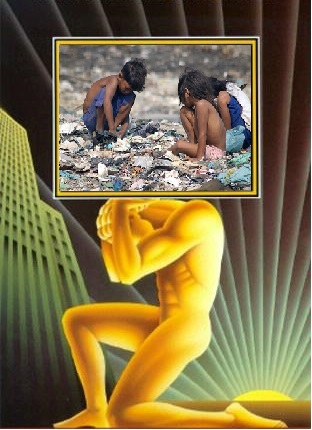For our first real post, we’ll turn to a deeply entrenched conservative belief. You might expect this on a site called ThisCentury(and Last)InStupid. It’s the idea that selfishness isn’t so bad after all. In fact, we could use more of it.
Occasionally, someone comes out and states this explicitly, but not usually. More often its the implied justification of cruel policy. Or it appears as an allegory as in Paul Ryan’s favorite ode to greed, Atlas Shrugged. As will be familiar to many, Atlas Shrugged is a novel by uber-capitalist and self-professed narcissist Ayn Rand about a fictional America in which all the captains of industry tire of being disrespected, regulated, demonized and (most egregiously) taxed and decide to flee society to a secret mountain enclave and live together in capitalist utopia. The rest of the country, bereft of its “engine” grinds to a halt. Poverty and violence ensue.
This vision is the engine behind Republican policies that, sometimes quite overtly, enrich

the wealthy at the expense of everyone else. One fine recent example is the refusal of Republican Governors across the country to expand Medicaid in their states. Although it would cost their governments very little, and benefit the poor quite a lot, the principle of giving as little to the poor as you can get away with is so ingrained that they’d rather leave the poor without health care and let them be treated in emergency rooms and the cost of their unpaid care absorbed into the premiums of the rest of the state.
Or there’s the fact that we can’t close the “carried interest” loophole by which the income of hedge fund managers is taxed as if it were long-term capital gains or dividends (on assets they don’t own!). No matter how you feel about lower rates on capital gains, these are clearly income. So, you have people paying 15% on their multi-million dollar income. The people emptying their trash pay a higher rate. There are efforts at very high levels to fix this, but none very successful.
Agitation against sensible policies to alleviate poverty are often accompanied by mumbled pseudo-economic arguments about how discouraging the money-making activities of the wealthy will harm us all or how giveaways to the poor create dependency. But, simmering beneath the surface of these attempts to make economics support fiscal austerity is an audacious Republican hope–one buoyed by this Randian vision. The wish at the heart of modern conservatism is that selfishness, in the end, will turn out to be altruism—that, when the score is all tallied, the best thing we can do for the poor is to stick it to them just as hard as we can. Thus conservative guilt is swept away by one swift stroke of Milton Friedman’s pen. This miraculous moral alchemy whereby, if two wrongs don’t make a right, nonetheless, two million do, is unchallenged on the Right since Adam Smith despite its manifest stupidity. This is partly because it’s unstated but also because it’s so damned useful. It was useful during the Cold War marriage of what today are called social and fiscal conservatism by severing the link between Christian charity and social welfare. It continues to be useful in justifying the neglect or animosity toward the social contract by the upper and middle classes today. It makes conservatism easier on the soul.
Now, some conservatives will try to separate personal and public morality saying that while public welfare programs harm the poor, private programs are another matter altogether. Of course, the original source of the charity can’t likely save the poor from the dependency-producing effects of free stuff. This view is likely more closely related to another pervasive dose of stupid up for discussion in a later post : “The government can’t do anything right.”
So, you heard it here first: Selfishness isn’t good. It isn’t noble or necessary or even inevitable. It wrecks communities and nations and, in a cosmically ironic twist, makes it’s practitioners the most miserable of all.
